North Carolina State University is making changes to its campus card, the Wolfpack One Card, with students, faculty and staff able to get their hands on the new credential this June. Among the changes is the ability for campus card holders to use their ID for debit transactions if they have a PNC Bank account.
As reported by student publication, The Technician, the redesign comes off the back of PNC Bank being named the official bank of NC State in October. The card, which has not been changed in several years, was redesigned for two reasons: modifications need to be made to accommodate the new relationship with PNC, and to make some security related modifications.
The new credentials will include a larger photo and will see student identification numbers moved to the back of the card. The front of the card will also feature a new university hallmark designed by University Communications.
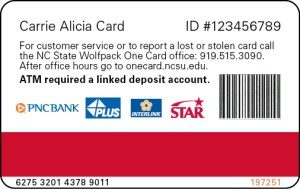
The new reverse side of the Wolfpack One Card.
“The key design features from a security standpoint are that it has a much larger photo and it has more white space so that it can be visually scanned a lot easier,” said Jennifer Gilmore, director of marketing and communication for Campus Enterprises. “It features their preferred name on the front, their legal name on the back, along with the student ID number on the back.”
The new ID cards will be distributed to incoming students during orientation this summer, while existing Wolfpack One Cards will continue to function normally and be phased out over time.
The new partnership between NC State and PNC Bank is expected to provide valuable services for students, faculty and staff, specifically in regard to the use of Wolfpack One Cards.
“The relationship with PNC is really expanding that so that a student can use their Wolfpack One Card and link it to a PNC checking account so that they can use a debit swipe with PIN transaction on campus,” said Rich Steele, interim associate vice chancellor for Campus Enterprises.
Students that elect to link their Wolfpack One Card with a PNC Bank account can also use the student ID for off-campus transactions and at PNC ATMs. PNC recently installed six ATMs on the NC State campus with a seventh on the way.
Any current students, faculty and staff can replace their old Wolfpack One Cards with the new credential if they want to link to their PNC account. Other cardholders can continue to use their existing ID without any interruption to card services.
The new PNC branch that is currently under construction on NC State's campus will be an electronic branch, or e-branch. Once construction is completed, the PNC e-branch will be directly adjacent to the Wolfpack One Card office.
Louisiana State University is the latest campus to recognize student preferred names on the campus card. The university announced in a press release this week that LSU students will be able to designate a chosen name, and have that name printed on their Tiger Cards, beginning with the fall 2018 semester.
As reported by The Daily Reveille, a preferred name policy was requested by the university's Office of Multicultural Affairs and the LGBTQ+ project, and was proposed in the Student Senate last October. During that process, student representatives from LSU looked to peer institutions Texas A&M University and the University of Alabama to formulate a proposal.
“Students having the ability to use their chosen name on their Tiger Card contributes to an inclusive atmosphere for all members of the student body," said Dereck Rovaris, vice provost for diversity in a university press release. "Furthermore, it has been shown that having this type of policy in place benefits students’ overall well-being and health."
In addition to better accommodating the LGBTQ community, the initiative is also expected to benefit international students who may use a chosen name that is different from their legal name. Students' legal names will still be printed on the backs of all Tiger Cards so as to keep the credentials compliant with voter ID regulations in Louisiana.
In looking to other institutions' policies, LSU considered some campuses' inclusion of a form in the preferred name process that students must sign in order to implement a preferred name. These forms waive the legality of the student credential beyond campus use in exchange for having a preferred name printed on the card. This type of stipulation is intended to make the cards valid only at the university for the purpose of identification, and remove its validity as an official method of identification beyond campus walls.
“We are excited to be able to provide this option to students," said Margot Carroll, assistant vice president of auxiliary services in the official press release. "This was initiated by students, and we are pleased to be able to help promote inclusivity and allow all individuals to feel welcomed at LSU."
The winners of 2018 NACCU Annual awards were announced on April 25, 2018 at the Association’s 25th Annual Conference in Reno, Nevada. Headlining the award winners was the Distinguished Service Award, which was given to Georgia Tech’s James Pete in recognition for his many years of dedicated service to NACCU, as well as his participation in Association events. Additionally, NACCU recognizes the following individuals and institutions for their accomplishments.
Erin Chezick is the recipient of the 2018 NACCU New Professional Award. The award was presented by Leti Turnbull-Mason from award sponsor Wells Fargo.
Established in 2012, the New Professional Award is designed to recognize contributions to the industry and the association by individuals early in their careers. The Award is presented to an individual who has contributed to the industry through a combination of Conference events, New Professional Institutes, an other service contributions to the Association.
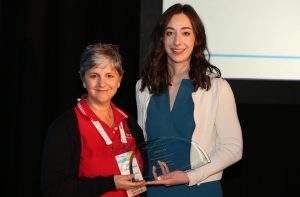
Having only been involved in the campus card industry since 2014, Erin has contributed to her university and to NACCU as a volunteer. She has also made a significant impact since joining Carleton University’s campus card services.
At Carleton, Erin developed and implemented a comprehensive student staffing process that has proven beneficial for all that have adopted it. The process includes interactive training components, feedback, and enhanced communication. She also led the implementation of the Universal Transit Pass's smart card program at Carleton, while continuing to pursue solutions that will integrate the student ID and bus pass to one card.
Erin also took on the task of performing a review of her department, which had not been done since 2004. As a result, Erin was able to introduce a strategy for tracking and prioritizing projects.
Beyond her work at the university, Erin has been very active within NACCU. In addition to attending numerous conferences, she has participated as a presenter, a committee member, and a committee chair. She has also served as a member of the mentor program and as faculty for the New Professionals Institute (NPI).
USCard Services at the University of Southern California received the 2018 Best Marketing Campaign Award. NACCU Board President Ken Boyer presented the award to Loryetta Council and William Bourlier during the 25th Annual Conference in Reno on April 25, 2018.

The NACCU Best Marketing Campaign Award is presented to an institution to recognize implementation of an integrated marketing strategy that has achieved measurable results, to encourage participation in the Association and the industry, and to gather ideas and resources that can be shared by other NACCU Members.
USCard Services found themselves dissatisfied with the participation of students submitting images online, as well as with the way ID cards were being distributed during orientations. In search of a solution, they met with the Orientation Program’s senior leadership and expressed their interest in being more active in the orientation programs to benefit both groups, while enhancing the orientation experience for students.
USCard began an email and postcard program to reach new students attending one of USC’s 19 new student orientation programs. ID cards were distributed with an information-filled postcard at the Student Services Expo, where incoming students were celebrated with Instagram posts. From those posts, one lucky freshman was given a USC backpack during each of the freshman orientation’s Instagram raffle.
The results were significant. Online photo submission and ID card distribution for each orientation event increased from 83% of all participants during the Summer 2016 cycle to 94% for Summer 2017. Additionally, credit card deposits increased by 8% and cash deposits increased by 40%.
Downloads of USCard’s mobile app increased by a staggering 158%, and there were 1,578 new registrations for the Tapingo app. Attendance at the Student Services Expo increased dramatically and parents and students were more engaged and felt more involved as “official Trojans.”
View USC's award submission to learn more about what USCard Services accomplished through this initiative.
The University of Montana received the 2018 NACCU Innovative Technology Award. Brett St. Pierre from award sponsor HID Global/ASSA ABLOY presented the award to Montana’s Maggie McCarthy.
Established in 2012, the NACCU Innovative Technology Award is presented to an institution that has introduced a unique technology-based solution to a problem or opportunity. The award’s purpose is to encourage members to share unique and innovative ideas with other members, as well as to recognize those who make significant technological contributions to the industry.

The University of Montana’s Griz Card Center first launched UMoney, a flexible spending account, in the early ‘90s. From the beginning, a tedious process was used to review and process inactive flexible spending account balances. During an audit in January 2016, it became obvious that it was time to automate the processes and terms and conditions.
The University of Montana wanted an automated process to notify customers after nine months of inactivity, giving them three months to take action, after which the account would be zeroed. The university also wanted an automated process to report fees assessed for account closure, and any refund amounts. Finally, funds would be automatically refunded to the customer.
This entire process had to include a clear audit trail, and integration with multiple softwares, including Blackboard Transact and Banner, was a necessity. Due to the complexity of requirements, it was determined that UM’s Student Affairs IT Web Team would build a custom web-based application.
Prior to implementation of the app, there were 8,079 UMoney accounts that should have been zeroed out following the former manual process, along with more than $10,000 in UMoney accounts still being held in trust. An overwhelming 89% of the accounts held a balance of under $10, which would have been zeroed out when the administrative fee was assessed.
The solution to Montana’s problem came in the form of the Unclaimed Property Web Application, which combines a number of previously manual processes into one comprehensive automated process. Customer service has been improved, and the time spent on inactive accounts has been reduced to under two hours per month. Additionally, the university is now fully compliant with state law regarding unclaimed property.
Since the implementation of the Unclaimed Property Web Application, $17,822 has been refunded through UM’s Business Services process, and $16,265 in administrative fees have been assessed. To learn more, view Montana's award submission.
Liberty University received the 2018 NACCU Best Video Award for its Flames Pass promotional video. Janeil Pyton and Maegan Immordino accepted the award from NACCU Immediate Past President Jessica Bender.
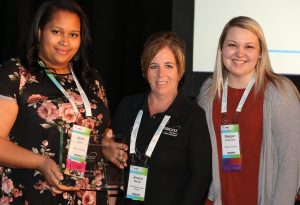
Liberty’s video was created to inform students, faculty and staff about the Flames Pass — the official Liberty University ID — and its many uses, as well as shed light on the benefits of using the university’s declining balance account, Flames Cash.
The idea for the video was to capture the attention of multiple generations, from incoming freshmen to Liberty’s extensive online population. The video provides fun and entertaining way to engage with the student population, while offering the need-to-know information from ID & Campus Services.
The Liberty University Marketing Department was responsible for the creation and execution of the video, while the ID & Campus Services department provided an outline of content and was actively involved in editing the script and providing feedback.
View the winning video:
Coastal Carolina University’s CINO card received the 2018 NACCU Best Card Design Award . Scott Gallimore accepted the award from Danny Smith and award sponsor, ColorID.

The NACCU Best Card Design Award is presented to the institution who is first selected as one of five finalists by the Awards Committee based on a grading matrix, then receives the most votes from NACCU members prior to and during the NACCU Annual Conference.
The other finalists up for votes at the Conference were Central Washington University, Dalhousie University, Michigan Technological University and the University of Montana-Western.
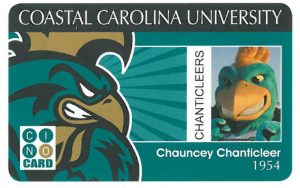
Coastal's CINO card was initially redesigned four years ago, then updated in Summer 2017 to include an expiration date. The purpose of the initial redesign was to update the card’s graphics to make it coherent with the university’s branding.
An expiration date was also added to the CINO Card last year, and the office is in the process of updating cards to reflect that change. Gallimore says there are no other plans to change the design again anytime soon.
James “Jim” Pete received the 2018 NACCU Distinguished Service Award during the 25th Annual NACCU Conference in Reno on April 25, 2018. The award was presented by ASSA ABLOY’s Angelo Faenza.
The NACCU Distinguished Service Award, sponsored by ASSA ABLOY/PERSONA, is presented to recognize an individual who has made contributions not only to a particular campus, but to the card services industry as a whole — raising the stature of the profession.
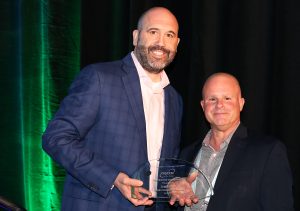
James Pete (left) receives the 2018 NACCU Distinguished Service Award from ASSA ABLOY's Angelo Faenza (right).
The recipient of the 2018 Award, Jim Pete is the Deputy Chief Information Officer for Campus Services at the Georgia Institute of Technology. Jim’s focus at Georgia Tech is all about team effort with campus services and partnerships both on and off campus.
Jim's accomplishments during his tenure at Georgia Tech are extensive and include creating the first Georgia Tech campus card program, the “BuzzCard.” Jim also championed the next phase of the campus card program by enabling smart contactless credential technology.
Most recently he has begun initiating a $13 million-dollar, 4-year project to reimplement physical access control across the Georgia Tech campus. The project involves transitioning three existing systems of records to a single platform. Jim has also recently collaborated with the Georgia Tech Athletic Association, Sodexo, and Blackboard to deploy a Sequoia point-of sale platform throughout all campus athletic facilities.
In addition to his accomplishments at Georgie Tech, Jim has also demonstrated his appreciation for sharing campus card knowledge with others through his participation at conferences, training events and webinars.
Having only missed two NACCU Annual conferences since attending his first in 1997, Jim’s service and dedication to NACCU has been tremendous. During this time, Jim served on numerous conference committees and the Board of Directors as Treasurer, then President.
His accomplishments while serving on the Board include the development of an Association Reserve Policy, implementation of a five-year budget forecasting model, crafting a new Committee Guidelines and Responsibilities framework, and leading the planning activities for the 2012 conference held in Seattle, Washington.
Jim has been a leader, innovator, visionary and devoted member of NACCU and the campus card industry. NACCU congratulates James Pete as the recipient of the 2018 NACCU Distinguished Service Award.
Pittsburgh’s Penn Hills School District is stepping up its campus security efforts with the installation of the Raptor visitor management system. The system will help boost campus security by identifying and badging all visitors to district campuses.
K12 schools around the country are taking increased measures to better ensure the safety and security of their campuses and students. With the ever present concern of active shooter situations and other campus threats, visitor management is being seen a vital first step toward mitigating some of these security risks.
According to a TribLive report, the Penn Hills School District’s technology director identified the Raptor system, launched this month, as a cheaper and more efficient alternative to the previous visitor management system that the district previously had in place.
As with other K12 environments that have chosen similar visitor management systems, the major benefit to campus security is knowing exactly who is campus facilities and when. The Raptor system deployed at Penn Hills campuses will better screen campus visitors, contractors and volunteers that routinely enter school grounds. Visitors will have the same experience when entering school premises, and will continue to provide a valid photo ID as part of the visitor management process.
The system automatically checks the visitor's name and date of birth and then checks against national databases of registered sex offenders. No other data from the visitor’s ID is gathered or recorded, and the information is not shared with any outside agencies. Once entry is approved, the system will issue a temporary badge that identifies the visitor’s name, the date, and purpose of visit.
Visitor to Penn Hills campuses will also have their state-issued ID held at the school security office for the duration of their visit and have it returned once signed out of campus premises. To better lock down campuses, no access will be granted to any visitors that fail to produce an official form of photo ID.
Richard Tamborelli was welcomed as NACCU President at the NACCU 25th Annual Conference last month in Reno, Nevada. Richard was elected as NACCU President-Elect at the Annual Meeting of the membership in Orlando in 2017, and in accordance with bylaws, began serving as President at the 2018 Annual Meeting. He will serve as President through the 2019 Annual Conference, at which point he will become Immediate Past President and will serve in that role through the completion of the 2019 Annual Conference.
Richard is the Associate Director of Card Services at Rhode Island School of Design, RISD, in Providence, Rhode Island. A 25-year employee of RISD, Richard began working in the Card Services office as Card Access Coordinator in 2003. In his role as Card Access Coordinator, Richard developed the campus access control and video surveillance programs, bringing on-line access control to all academic and residential facilities as well as off-line access control to all residential units.
In his time at RISD, Tamborelli has been involved in several system upgrades and integrations, including an access control migration and the development of CBORD’s GET and UGryd programs. In addition to CBORD’s GET and UGryd programs, he also manages the university's RISDbucks program, laundry service, access control and VMS program. Additionally, he supports RISD’s public transportation (RIPTA) and ZipCar programs.
Richard has been a member of NACCU since 2003 and has served on the Board of Directors since 2015. He has attended numerous NACCU conferences, and prior to serving on the Board, volunteered as a moderator and served on committees. NACCU is proud to officially introduce Richard Tamborelli as President of the NACCU Board of Directors.
NACCU also welcomed its newly elected Board members, and said goodbye to two retiring members, at the Annual Business Luncheon in Reno on April 24, 2018.
The NACCU Board of Directors are nominated and elected by NACCU institutional members each year. This year, two NACCU Board members are retiring. Jessica Bender from Palm Beach State College completed her second term on the Board, after serving as President in 2016-2017. Tova Dutcher has left her position at Tompkins Cortland Community College, and therefore, retired from her position on the Board.
NACCU thanks Jessica and Tova for their service, and welcomes three individuals to the Board:
All three newly elected board members have been active Association members, and NACCU is proud to welcome them to their new positions.
David Anthony from The Ohio State University has been elected by membership as President-Elect. His term as President will begin after the conclusion of the Annual Business Meeting at the 26th Annual NACCU Conference in Hartford, Connecticut in April 2019. Other appointed positions include:
For a complete look at Board member roles and terms, visit NACCU's Board of Directors page.
Students at the University of Arizona have a new alternative to parking around the flagship Tucson campus thanks to parking app, Air Garage.
As reported by Tucson News Now, the Air Garage app launched in Tucson earlier this month and has already seen several dozen people start renting out parking spots to students. The app enables users to rent spaces at their home and in driveways near campus to make some quick cash and help students in need of a parking spot.
Campus parking is a struggle for universities large and small, and the situation is no different at U of A. Hefty parking prices, frustration and wasted time looking for an open spot, and a potentially long walk to class in the Arizona heat make parking solutions like Air Garage an ideal alternative.
The idea behind the app is that local businesses, churches, and individual homeowners can rent out their extra parking spots or driveways. It's not an entirely novel idea, as homeowners near the university have done similar things during big sporting events like football games, but the app could make everyday parking more manageable.
Prices for parking spots on Air Garage are determined by the spot owners, and the company charges a small fee on top of the spot price. AirGarage also handles all of the payment details so that no money exchanges happen between renters and spot owners. Parking reservations are primarily billed on a monthly basis, but can be stopped at any time.
Since it's launch at U of A, some 60 parking spots have been listed for anywhere between $20 and $75 a month.
Air Garage was developed by two Arizona State University alums and has already been implemented around ASU's campus. Users can search for open spots directly from the website find basic information, a description of the parking spot, and the price requested by the owner. Spot listings are transparent in this way so that users know what they’re paying for.
With the swipe of a student ID card, Grand Rapids Community College is offering free laptop rentals to students. The service is being offered via vending machine, giving students an alternative to accessing the technology needed to support their academic work.
Renting laptops and tablets isn’t a new service on college campuses, but the means in which these valuable resources are distributed to students is becoming increasingly automated. As reported by MLive, Grand Rapids began a pilot program late last year with the Dallas, Texas-based Laptops Anytime, to implement a laptop vending machine in the college’s student center. The vending machine cost Grand Rapids Community College $35,000, paid for with a grant from the college's Strategic Leadership Team.
Checking out a laptop from the vending machine is as quick and easy as any other vending purchase. Students simply enter their last name on the touchscreen and swipe their student ID card, at which point a laptop pops out from one of the machine's twelve charging ports.
The fully charged laptops are available to rent in four-hour increments, and students simply return the computers back to the vending machine anytime before the end of their session. The vending machine automatically wipes the laptop clean of the student’s work session and recharges it for the next rental.
The new vending machine joins existing rental options at Grand Rapids' campus library, as well as the college’s standard computer labs.
According to the college’s IT department, more than 500 students have checked out a laptop, logging a total usage time of roughly 660 hours without any issues. These results, in turn, have led the college to consider an expansion to the program, adding other campus locations as well as the addition of tablet rentals.
The vending machines are configurable to suit the specific deployment, holding anywhere from six to 12 devices in a single machine, with optional 12 or 18 bay add-ons. The company also offers either a barcode or card reader option to support device checkout.
In addition to college and university campuses the machines are also being deployed in public libraries. The initiative at Grand Rapids Community College marks Laptops Anytime’s first install in the state of Michigan, but the company is already in 31 states and four foreign countries.
Denmark’s Copenhagen Business School will be one of the first institutions in the world to enable students to make purchases in a campus restaurant and coffee shop using only their finger.
As reported by Planet Biometrics, the new biometric payment initiative will be delivered by a partnership between Danish debit card provider, Dankort, and British fintech firm, Sthaler.
The system will use Sthaler’s Fingopay reader that leverages Hitachi’s VeinID technology and infrared light to map the unique 3D pattern of veins in a customer’s finger. The resulting biometric signature represents a one-of-a-kind, personal identifier. The biometric signature can be used to verify both identity and payment in seconds.
As of last month, the 21,000 Copenhagen Business School students and 600 full-time academic staff were all able to use Fingopay in the campus canteen.
A similar deployment has previously been implemented on the Brunel University campus in London, where students are paying at the till using Fingopay to identify themselves. In that installation, some 1,000 students at Brunel University have already signed up to pay for their groceries with only their finger. But the implementation at Copenhagen Business School represents the first instance of the solution being used in a self-service restaurant application.
Finger vein payments have grown in popularity across Europe and some spot implementations in Asia, with other use cases including physical access and workforce management.
The biometric payment initiative is also recognition that, in the future, the payment card may not necessarily be plastic. Whether app-based or biometric, Dankort sees initiatives like that at the Copenhagen Business School as a vital first step toward life beyond physical cards.
Greensboro, South Carolina's Guilford School District will issue onecards to all students for use when boarding school buses. The new onecard system is being implemented to boost security, as well as improve school officials' ability to maintain knowledge of student locations.
According to local CBS affiliate WFMY News, Guilford County Schools will issue all students a new student ID and onecard system beginning with the coming school year.
The onecard formula is nothing new, as higher education campuses have been leveraging and expanding on the technology for years. But with security concerns on the rise, the K12 environment seems to be coming around to the idea of a single credential to support student life.
“The OneCard has great implications for our schools,” said Superintendent Sharon L. Contreras in a release from the district. “Not only will it help us know who is in our buildings, it has the potential to provide students with a singular way to access materials and resources throughout the community.”
Beginning with the 2018/2019 academic year, the student ID cards will be used for all school bus boardings and exits to ensure students board the correct bus and leave at the correct stop.
The new ID cards will include students' photo, name, grade and classroom. Seven area schools will begin using the cards next year in with broader uses as part of a pilot program to determine how the system will be used going forward. The district says, in the future the card could be used to track attendance at all schools and be used for entry to sporting events.
At the pilot schools, the OneCards will also be used to monitor attendance. As part of the pilot program, the card can be scanned at the building entrance, in the school's office, the media center and the cafeteria. It can also be used for checking out library books and purchasing meals.
The district will test how well the usage works at the pilot schools and hopes to eventually roll out the broader program to all schools. School officials say the expectation will be that students carry the new cards with them at all times, with override procedures to provide access to buses and school buildings if a student loses the credential.
The student ID cards will be printed at a single, central location and then distributed to each school. The school board approved a contract with Synovia, a company that specializes in fleet tracking solutions, to assist with the installation and implementation process.
Guilford County Schools serves some 73,000 students. Between card issuance, equipment and necessary training for the pilot schools, the total up-front cost of the onecard system is $131,000, with a projected annual recurring cost of $79,015.

